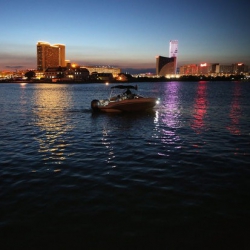
The likeliest sites for the North Jersey casinos would have been the Newark, Jersey City, and the Meadowlands.
New Jersey voters overwhelmingly rejected a brick-and-mortar casino expansion into North Jersey. The casino referendum is losing by a 78% to 22% margin with 93 precincts reporting.
The initiative is set to fail by 1.5 million votes, which would exceed the previous mark for a referendum. That record was set in 1987, when the people of New Jersey voted on a plan to approve a Major League Baseball stadium for the Meadowlands. That measure lost by 500,000 votes.
North Jersey Casino Plan
The North Jersey casino vote asked the people of the state to approve a bill to allow up to 2 casinos to be built at least 72 miles away from Atlantic City. The loss was expected, because the leading group supporting the plan, Our Turn NJ, ended its advertising campaign more than a month before Election Day.
Tioga Downs racetrack owner Jeffrey Gural and former Rebook CEO Paul Fireman funded Our Turn NJ. The two released a statement on the vote, saying they were “disappointed, but not surprised” by the result.
Paul Fireman and Jeff Gural
In their joint statement, Fireman and Gural said, “We do not view the failure to pass Question No. 1 as a rejection of gaming expansion but as a rejection of our state’s current political climate and a failure to have all the facts presented to them.”
Paul Fireman wanted to build an integrated casino-resort in Jersey City, facing New York City. Jeff Gural sought to build a casino on the grounds of Meadowlands Racetrack, where he has a lease.
“Need to Start from the Beginning” Next Time
The two would-be developers tried to spin the defeat the best that they could. Gural and Fireman hinted that they might seek to pass a North Jersey casino referendum at a later date. The referendum could not be voted upon until 2018 at the earliest.
Fireman and Gural added, “New Jersey has to start from the beginning on gaming expansion. What the people of this state need to see is a transparent, competitive plan that outlines in full detail how gaming expansion would work.”
Early indications are that a possible 2018 initiative would include 1 casino in North Jersey. The details for the casino’s location would be nailed-down before the vote. It is thought that much of the opposition from North Jersey voters involved concern that a casino would be placed in their community, which is undesireable to many homeowners.
If a North Jersey casino plan for the Meadowlands (for example) were put up for a vote, it is thought this would receive much more support than a vague plan for casinos somewhere. Also, it is thought that the desire to pigeonhole who could submit a license applications (Atlantic City casino owners only) also had an effect on the pro-North Jersey effort.
If Wynn Resorts and Las Vegas Sands were allowed to apply for a license among the first wave of applicants, it is thought Steve Wynn and Sheldon Adelson might spend significant money to sculpt public opinion on the matter, as a form of investment in one of the most lucrative casinos in the United States.
Trenton’s Bad Bet
The main opposition group was “Trenton’s Bad Bet”, which sought to block expansion of land-based casino gambling beyond Atlantic City. In New Jersey’s 40-year experiment with casino gambling, Atlantic City has enjoyed a monopoly.
The fracturing of the northeastern gaming market saw a collapse of Atlantic City’s gaming revenues. In 2006, Atlantic City generated $5.4 billion in casino revenues. In 2016, that number is likely to be closer to $2.0 billion or $2.1 billion.
“A Broad Coalition”
Bill Cortese, the executive director of Trenton’s Bad Bet, said, “A broad coalition of community leaders, unions, small businesses and residents who are convinced that North Jersey casinos would be a detriment to the entire state.”
Those who opposed the North Jersey casino referendum are likely to point to the record loss as a sign that the proposition does not deserve another vote. The vote gives Atlantic City’s casinos two more years to prove they can be financially successful and self-sustaining. Meanwhile, Atlantic City’s finances are likely to fall under control of the state of New Jersey’s financial officials.
If Atlantic City’s casino industry continues to falter, Gural and Fireman might be right that New Jersey’s electorate could change its mind in two to four years. Facts on the ground can change dramatically in a couple of years, while people’s perceptions and attitudes also can change in that time.
